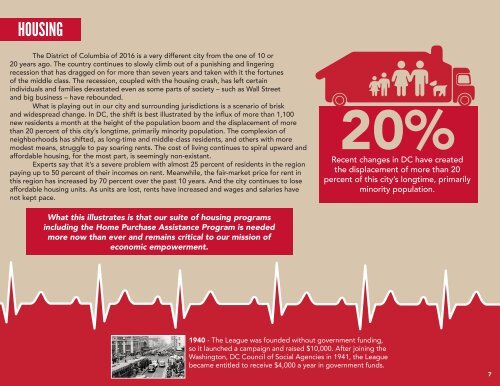78 YEARS HEARTBEAT COMMUNITY
GWULImpact2015
GWULImpact2015
You also want an ePaper? Increase the reach of your titles
YUMPU automatically turns print PDFs into web optimized ePapers that Google loves.
HOUSING<br />
The District of Columbia of 2016 is a very different city from the one of 10 or<br />
20 years ago. The country continues to slowly climb out of a punishing and lingering<br />
recession that has dragged on for more than seven years and taken with it the fortunes<br />
of the middle class. The recession, coupled with the housing crash, has left certain<br />
individuals and families devastated even as some parts of society – such as Wall Street<br />
and big business – have rebounded.<br />
What is playing out in our city and surrounding jurisdictions is a scenario of brisk<br />
and widespread change. In DC, the shift is best illustrated by the influx of more than 1,100<br />
new residents a month at the height of the population boom and the displacement of more<br />
than 20 percent of this city’s longtime, primarily minority population. The complexion of<br />
neighborhoods has shifted, as long-time and middle-class residents, and others with more<br />
modest means, struggle to pay soaring rents. The cost of living continues to spiral upward and<br />
affordable housing, for the most part, is seemingly non-existant.<br />
Experts say that it’s a severe problem with almost 25 percent of residents in the region<br />
paying up to 50 percent of their incomes on rent. Meanwhile, the fair-market price for rent in<br />
this region has increased by 70 percent over the past 10 years. And the city continues to lose<br />
affordable housing units. As units are lost, rents have increased and wages and salaries have<br />
not kept pace.<br />
20%<br />
Recent changes in DC have created<br />
the displacement of more than 20<br />
percent of this city’s longtime, primarily<br />
minority population.<br />
What this illustrates is that our suite of housing programs<br />
including the Home Purchase Assistance Program is needed<br />
more now than ever and remains critical to our mission of<br />
economic empowerment.<br />
1940 - The League was founded without government funding,<br />
so it launched a campaign and raised $10,000. After joining the<br />
Washington, DC Council of Social Agencies in 1941, the League<br />
became entitled to receive $4,000 a year in government funds.<br />
7


